Cloves are often praised as a super-spice. From adding rich flavor to dishes to offering powerful medicinal properties, these little flower buds from the clove tree are loaded with antioxidants, anti-inflammatory agents, and natural compounds that boost overall health.
But here’s the catch: cloves aren’t for everyone.
In certain health conditions, cloves can do more harm than good—and most people have no idea. Let’s break down the situations where cloves might be risky and why you should think twice before adding them to your routine.
1. 🔥 GERD or Acid Reflux? Cloves Could Make It Worse
Cloves contain eugenol, a compound that relaxes muscles—including the lower esophageal sphincter. That sounds good until you realize this may allow stomach acid to travel back up into your esophagus, worsening symptoms of acid reflux or GERD. If heartburn is your frequent visitor, it’s best to skip cloves—or talk to your doctor first.
2. 💉 On Blood Thinners or Have a Bleeding Disorder? Be Careful
Cloves naturally thin the blood. That’s great for heart health in general—but not if you have hemophilia, a blood clotting issue, or are on medications like warfarin. Combining them could raise your risk of internal bleeding. Always check with a healthcare provider before use.
3. 🤧 Allergic to Spices? Cloves Might Trigger a Reaction
If you’re sensitive to spices or members of the Myrtaceae family (like eucalyptus or guava), cloves could cause allergic symptoms such as itching, swelling, or respiratory problems. Do a patch test or start with a tiny amount if you’re unsure.
4. 🤰 Pregnant or Breastfeeding? Use Extreme Caution
While cloves can relieve minor pregnancy-related discomforts, consuming them in large amounts may stimulate uterine contractions. This can pose a risk, especially in early pregnancy. Nursing moms should also be cautious—eugenol can pass through breast milk, potentially affecting your baby.
5. 🧬 Have Liver Issues? Cloves May Be Too Harsh
The eugenol in cloves is powerful—but too much can be toxic to the liver. If you’re dealing with liver disease, fatty liver, or have a history of liver dysfunction, avoid clove oil and large doses of cloves altogether.
6. 🧯 Got Stomach Ulcers? Cloves Could Aggravate It
Cloves are known to stimulate digestion, but in people with ulcers or gastritis, they might actually irritate the stomach lining and worsen symptoms. Instead of soothing your gut, they could ramp up discomfort and acid levels.
7. 🩸 Struggling with Low Blood Sugar? Beware
Cloves are praised for helping regulate blood sugar—but if you already deal with hypoglycemia, consuming cloves could drop your sugar even lower. Not fun when you’re trying to avoid dizziness, fatigue, or fainting spells. Monitor your intake and talk to your doctor if unsure.
8. 🚱 Kidney Conditions? Cloves Might Add Extra Strain
Using too much clove oil or overloading on cloves in your diet may put stress on your kidneys, especially if they’re already struggling. Those with chronic kidney disease should limit clove use and avoid essential oils unless prescribed.
9. 🚫 Sensitive Skin? Clove Oil Might Irritate
Clove oil is super concentrated—and it can burn or irritate sensitive skin. If you’re planning to use it for toothaches, acne, or massage, dilute it first and always do a patch test. Never apply directly to open wounds or broken skin.
Bottom Line: Cloves Are Powerful—but Not for Everyone
We get it—cloves are natural, affordable, and offer some real health perks. But for people with certain conditions, they can cause unexpected complications.
If you’re in any of these groups:
- Dealing with reflux, ulcers, or liver problems
- On blood thinners
- Pregnant or breastfeeding
- Have allergies, kidney issues, or skin sensitivity
…then press pause before adding cloves to your diet or wellness routine.
👉 Pro Tip: Always use cloves in moderation, and choose whole cloves or reputable essential oils. And when in doubt? Talk to your doctor first.
Remember: Natural doesn’t always mean safe for everyone.
Sometimes, the best decision for your health is knowing when to say no to even the healthiest trends.



